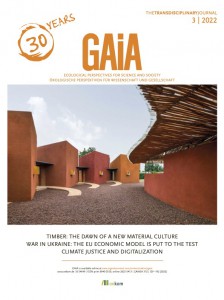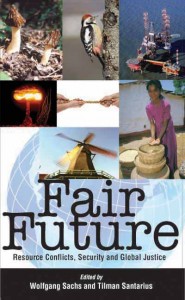Climate justice and digitalization. A plea to consider broader socio-economic implications of digitalization and climate change
 This article by Tilman Santarius in the Journal GAIA Justice and Digitalization – GAIA 2022 considers the broader socio-economic implications of digitalization on various dimensions of climate justice. Indeed, digitalization will affect the way the impacts of global warming and the co-benefits of climate protection are distributed. To advance fair benefit sharing of digital climate technologies, the decentralization of technological development must be initiated, and rules for fair competition must be established.
This article by Tilman Santarius in the Journal GAIA Justice and Digitalization – GAIA 2022 considers the broader socio-economic implications of digitalization on various dimensions of climate justice. Indeed, digitalization will affect the way the impacts of global warming and the co-benefits of climate protection are distributed. To advance fair benefit sharing of digital climate technologies, the decentralization of technological development must be initiated, and rules for fair competition must be established.
Fair Future. Limited Resources and Global Justice.
 Oil crisis, water conflicts, declining food security – we hear one report after another about resource scarcity – while with growing populations and huge poverty, nations are demanding their right to development. Clashes over resources, both major and minor, are often the unseen factor behind chaos and violence and it is vital to start thinking about how the distribution of resources can be made more just. This book, written by specialists from the internationally renowned Wuppertal Institute headed by Wolfgang Sachs and Tilman Santarius, puts forwards perspectives for resource justice and outlines a global economic and environmental policy equally committed to nature and to humanity.
Oil crisis, water conflicts, declining food security – we hear one report after another about resource scarcity – while with growing populations and huge poverty, nations are demanding their right to development. Clashes over resources, both major and minor, are often the unseen factor behind chaos and violence and it is vital to start thinking about how the distribution of resources can be made more just. This book, written by specialists from the internationally renowned Wuppertal Institute headed by Wolfgang Sachs and Tilman Santarius, puts forwards perspectives for resource justice and outlines a global economic and environmental policy equally committed to nature and to humanity.